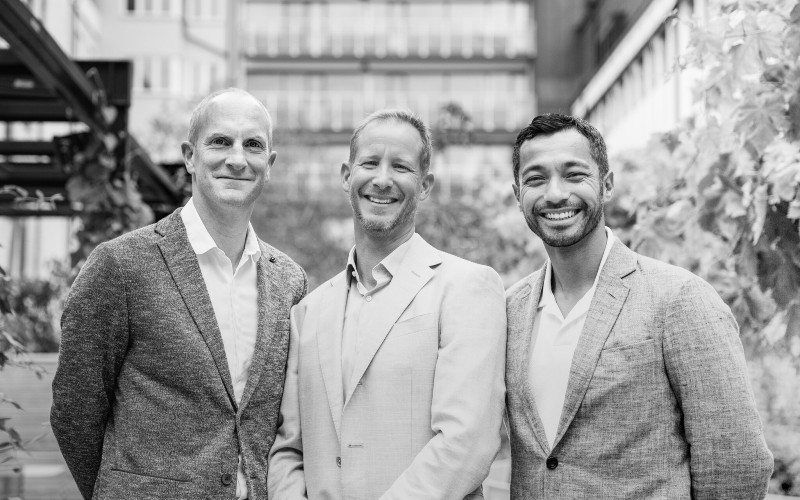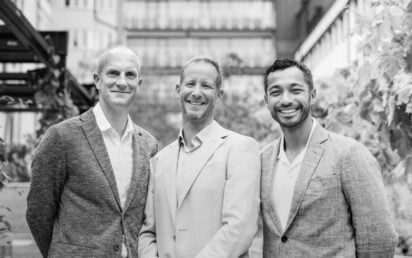When Hugh Campbell took to the stage at last week’s Northern Tech Awards at Leeds’ New Dock Hall it signalled that the long wait was finally over.
The managing partner of GP Bullhound has become the public face of the prestigious tech awards, which were last held in-person in March 2019 because of COVID-19.
Campbell’s opening address and summary of the previous 12 months have become a fixture of the GP Bullhound Northern Tech Awards, now in their eighth consecutive year.
However the story behind GP Bullhound’s own success and remarkable longevity is as impressive as any one of the businesses that they celebrate.
It was back in 1999 that Campbell co-founded GP Bullhound with Manish Madhvani, Per Roman and Christian Lagerling after they identified a gap in the market for a European investment bank.
Campbell, Madhvani and Roman bought Lagerling out 10 years ago but the other three co-founders remain at the heart of the business, which today employs 150 people across 12 offices and is on track for record revenues this year of $100m.
According to Campbell, who set up the firm’s Manchester office in 2013, the secret of their success is a business model called the Entrepreneur Clock, which the founders scratched out on the back of a napkin in Richmond more than two decades ago.
He explains: “The Entrepreneur Clock is about building a set of products and services around founders. Founders are at the centre of the GP Bullhound world.
“We’ve basically done the same thing for 20 years. That has great strength in an industry that is principally based on trust.
“By having an Entrepreneur Clock it means there is tremendous variety in our day job. We’re not a one-trick pony. We’re not just selling businesses; or writing research; or making investments.
“For the three of us to have stayed together, this level of variety around the Entrepreneur Clock has been a critical piece.
“The Entrepreneur Clock makes you a humble servant to the entrepreneurs.”
GP Bullhound’s founder-centric business model can be broken down into four key strands: 1. Research and events; 2. Raising capital; 3. Selling businesses; and 4. Helping entrepreneurs reinvest the proceeds of any sale.
In 1999 Campbell was in his mid-20s when he and his co-founders launched GP Bullhound because of their shared belief that technology was going to change the world.
“The original idea was to bring the best of Silicon Valley to Europe,” he recalls.
“In those times we had the dot.com boom. All of the advisory and most of the investment businesses were flying over from the US, particularly the investment banks.
“We felt there was a real gap in the market for a European investment bank for European software entrepreneurs.
“What happened within a few months was the dot.com boom turned into the dot.com bust and most of the American banks either went bust or went back to the US with their tail between their legs.
“That left us with a gap in Europe and that was what we launched GP Bullhound into.”
As they set out to build a European investment bank the dot.com bust created an opportunity for the co-founders to build relationships and make friends with VCs and entrepreneurs in Europe who were having a tough time.
“Launching a business in a tough market is a very good place to be,” recalls Campbell.
“We knew long-term that software was going to be a critical source of oxygen for businesses.
“I’m not sure we thought it was going to become as big as it has or that it would take as long. We were in our late-20s and hoped everything was going to happen overnight – but it never did.”
Today GP Bullhound is split into an advisory business and an investment business and the remaining co-founders all have very distinct roles.
“Between the three of us we’ve realised where our strengths lie,” explains Campbell.
“Manish and I run the advisory business and Per runs the investment business. Per also has the creative marketing flair. He really drives the brand forward.
“I would say I’m responsible for the people side of the firm alongside the day job. The careers of all the staff, the recruitment policy etc.
“Manish is the chairman of the new business committee so determines what we take on and how those projects progress.”
The three co-founders speak three times a week even though they haven’t worked in the same office for a decade.
“In 2011 we had a bit of a founder diaspora,” recalls Campbell. “Prior to that we all sat in the same office in London.
“As our families grew and we tried to combine this hectic 24/7 work life with some family time we felt there was an opportunity to build a brand in Stockholm so Per moved back home and I moved to Manchester. Manish stayed in London. Christian was already in San Francisco.
“In your 30s, you think you know everything. You think your style of management and leadership is the only way to go. By spreading our wings a bit it enabled us to experiment with our own style of management while still working together day-to-day.
“In your 40s you become a bit humble – and the business has rocketed in our 40s.”


